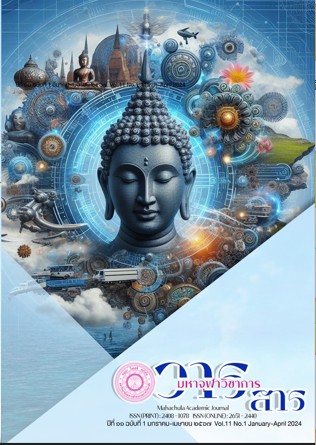Four Gharavasa-Dhamma, Sufficiency Economy Philosophy and Spiritual Well-Being of People at Ladphrao District in Bangkok
Main Article Content
Abstract
The objectives of this research were to: (1) study the level of four Gharavasa-dhamma, sufficiency economy philosophy and spiritual well-being of people at Ladphrao district; (2) compare spiritual well-being of people at Ladphrao district by personal factors; (3) study the relationship between four Gharavasa-dhamma and spiritual well-being of people at Ladphrao district and (4) study the relationship between sufficiency economy philosophy and spiritual well-being of people at Ladphrao district. The sample were 400 people at Ladphrao district, in Bangkok. Data were collected by questionnaires. Data analysis used by a statistical package program. The statistical methods used by percentage, mean, standard deviation, t-test, F-test and Pearson’s product moment correlation coefficient.
Results showed that: (1) four Gharavasa-dhamma, sufficiency economy philosophy and spiritual well-being of people at Ladphrao district were the relatively high level; (2) people at Ladphrao district had difference in occupation had difference spiritual well-being with statistically significant at .05 level; (3) four Gharavasa-dhamma positively related to spiritual well-being of people at Ladphrao district with statistically significance at .01 level and (4) sufficiency economy philosophy positively related to spiritual well-being of people at Ladphrao district with statistically significance at .01 level.
Article Details

This work is licensed under a Creative Commons Attribution-NonCommercial-NoDerivatives 4.0 International License.
References
คณะอนุกรรมการขับเคลื่อนเศรษฐกิจพอเพียง. การสร้างกระบวนการขับเคลื่อนเศรษฐกิจพอเพียง. กรุงเทพมหานคร: พริกหวานกราฟริค จำกัด, ๒๕๖๐.
ณัฐศรัณย์ ชุมวรฐายี. “ศึกษาหลักฆราวาสธรรม ๔ ในการดำเนินชีวิตของผู้ปฏิบัติวิปัสสนาภาวนาวัดปัญญานันทาราม จังหวัดปทุมธานี”. สารนิพนธ์พุทธศาสตรมหาบัณฑิต. สาขาวิปัสสนาภาวนา. บัณฑิตวิทยาลัย: มหาวิทยาลัยมหาจุฬาลงกรณราชวิทยาลัย, ๒๕๖๐.
ปริศนา โลมากุล. “การประยุกต์ใช้แนวคิดเศรษฐกิจพอเพียงในชีวิตประจำวันของประชาชนในอำเภอศรีราชา จังหวัดชลบุรี”. งานนิพนธ์บริหารธุรกิจมหาบัณฑิต สาขาการจัดการสาธารณะ. บัณฑิตวิทยาลัย: มหาวิทยาลัยบูรพา, ๒๕๖๐.
พระครูปริยัติธรรมวิบูล (ชวี อิสฺสโร). “รูปแบบการเสริมสร้างความผาสุกทางจิตวิญญาณของผู้สูงอายุตามหลักพุทธจิตวิทยา”. ดุษฎีนิพนธ์พุทธศาสตรดุษฎีบัณฑิต สาขาพุทธจิตวิทยา. บัณฑิตวิทยาลัย: มหาวิทยาลัยมหาจุฬาลงกรณราชวิทยาลัย, ๒๕๖๐.
พระครูสังฆรักษ์แดนชัย อภิชโย. “การใช้หลักฆราวาสธรรมในการพัฒนาคุณภาพชีวิตของประชาชนในเขตเทศบาล ตำบลสทิงพระ อำเภอสทิงพระ จังหวัดสงขลา”. วิทยานิพนธ์พุทธศาสตรมหาบัณฑิต สาขาการบริหารการศึกษา. บัณฑิตวิทยาลัย: มหาวิทยาลัยมหาจุฬาลงกรณราชวิทยาลัย, ๒๕๖๐.
วิทย์ วิศทเวทย์. ธรรมะศึกษาแห่งชาติ. กรุงเทพมหานคร: การพิมพ์พระนคร, ๒๕๖๐.
วิศิษฐ์ ฤทธิบุญไชย. “การปรับใช้หลักปรัชญาของเศรษฐกิจพอเพียงที่มีผลต่อการพัฒนาคุณภาพชีวิตของนักศึกษาในจังหวัดนครปฐม”. วิทยานิพนธ์บริหารธุรกิจมหาบัณฑิต สาขาการจัดการ. บัณฑิตวิทยาลัย: มหาวิทยาลัยราชภัฏนครปฐม, ๒๕๖๑.
สำนักงานคณะกรรมการการศึกษาแห่งชาติ. แผนการศึกษาแห่งชาติ. กรุงเทพมหานคร: พริกหวานกราฟริค จำกัด, ๒๕๖๐.
สำนักงานสถิติแห่งชาติ. การสำรวจประชากรผู้สูงอายุในประเทศไทย. กรุงเทพมหานคร: สำนักงานสถิติแห่งชาติ, ๒๕๖๕.
Bufford, R. K., Paloutzian, R. F., & Ellison, C. W. (1991). Norms for the spiritual well-being scale. Journal of Psychology and Theology, 19 (1) : 56-70.
Linda, N., Phetlhu, D., & Klopper, H. (2019). Nurse Educators’ Understanding of Spirituality and Spiritual Care in Nursing: A South African Perspective. International Journal of Africa Nursing Sciences, 12 (1) : 1-29.


